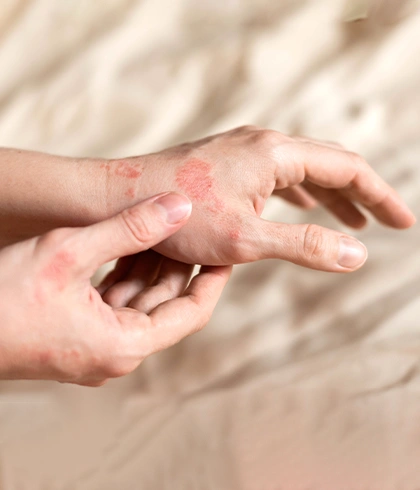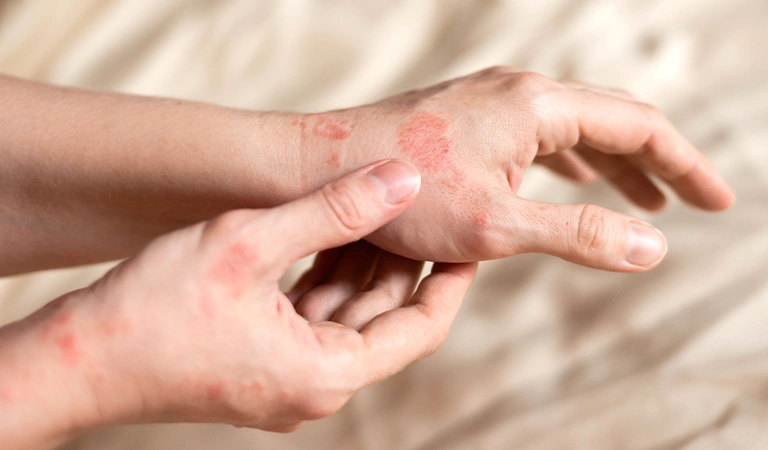

Is Eczema Contagious? What you need to know
Eczema is a common skin condition that affects people across all age groups. Despite its prevalence, there is significant confusion about whether eczema is contagious. In this blog, we will explore the myths and realities of eczema’s contagiousness, skin eczema types, complications, and safe treatments, with a focus on homeopathy’s role in managing the condition.
Is Eczema Contagious? Myths vs. Reality
Despite its appearance, eczema is not a contagious disease. Understanding the nature of eczema (skin allergy) can help dispel common myths surrounding it.
Debunking the Misconception
Eczema, also known as atopic dermatitis, is not contagious. It is a chronic inflammatory condition and not caused by a virus, bacteria, or any other pathogen. This means:
- Physical contact with someone who has eczema will not spread the condition.
- Sharing personal items or being in close proximity to an affected individual poses no risk.
The misconception arises because eczema symptoms like redness, swelling, and oozing resemble those of contagious skin diseases.
Take our Eczema Evaluation Test to know if it is eczema or any other skin allergy and get personalised homeopathic treatment with effective relief.
Why People Think Eczema is Contagious?
The appearance of eczema or skin allergy, with its redness, blisters, and rashes, often leads to misunderstandings. Many people mistake it for contagious skin conditions like ringworm or scabies. The lack of awareness further fuels social stigma, making life more difficult for those affected by eczema.
Hereditary Factors in Eczema
Eczema, particularly atopic eczema, has a strong genetic component. Research shows that genetic mutations, particularly in the filaggrin gene, can compromise the skin barrier, making it more susceptible to irritants and allergens.
Children with a parent or sibling with eczema have a significantly higher risk of developing it themselves. This risk increases further if both parents are affected. The exact inheritance pattern is complex and involves multiple genes, making it challenging to predict with certainty who will develop eczema. While it’s hereditary, it’s still not contagious.
Also Read: What Is The Best Way To Treat Chronic Eczema
Contagious Complications of Eczema
While eczema itself is not contagious, it can lead to infections that are. Here’s what you need to know.
When Eczema Leads to Contagious Infections?
Although eczema itself isn’t contagious, it can create openings in the skin. Open wounds from scratching can introduce infections, which may spread to others through contact:
- Bacterial Infections: Conditions like impetigo, caused by Staphylococcus aureus, can occur when bacteria enter the skin through cracks or lesions.
- Viral Infections: Eczema herpeticum, caused by the herpes simplex virus, is a serious infection that spreads through direct contact. It's particularly dangerous for people with weakened immune systems.
- Fungal Infections: Candida infections thrive in areas of damaged, inflamed skin and can be transmitted through physical contact or shared items.
These secondary infections require prompt medical attention to prevent further spread.
Also Read: What are the treatments for infected eczema?
What Skin Diseases Look Like Eczema but Are Contagious?
Certain skin conditions mimic eczema symptoms but are highly contagious.
Scabies
This is a skin infestation caused by tiny mites (Sarcoptes scabiei) burrowing into the skin, leading to intense itching and rash. Symptoms include blisters, tracks, and severe itching, especially at night. It is often present with small, raised, and crooked lines on the skin. Scabies is highly contagious through skin-to-skin contact or sharing personal items like bedding and towels.
Fungal Infections
Fungal infections, caused by dermatophytes or Candida species, can affect the skin folds or open areas. Symptoms include redness, blistering, and scaling, similar to eczema. These infections spread through contact with infected individuals, contaminated objects, or damp environments like swimming pools.
Differentiating between these conditions and eczema is vital for accurate diagnosis and treatment.
Take our skin evaluation test and understand what is bothering your skin to get personalized skin care treatment with effective relief.
Also Read: Psoriasis Or Eczema - What’s The Difference?
How Homeopathy Can Help Manage Eczema Safely?
Homeopathy offers a holistic approach to managing eczema, focusing on the root causes rather than just eczema symptoms.
Root-Cause Treatment
Homeopathy focuses on treating the underlying causes of eczema rather than just managing symptoms. It strengthens the immune system, reduces skin sensitivity, and addresses internal triggers like:
- Stress: Can weaken the immune system and worsen eczema.
- Dietary Habits: Certain foods can cause inflammation and trigger eczema.
- Hormonal Imbalances: Hormonal changes can disrupt skin health and lead to flare-ups.
By targeting these factors, homeopathy offers a more comprehensive approach to managing eczema.
Also Read: What Is The Best Way To Treat Chronic Eczema
Practical Tips to Prevent Eczema Flare-Ups and Complications
Managing eczema involves proactive care and avoiding triggers. Here are some practical tips:
Skincare Tips
Proper skincare plays a crucial role in managing eczema. Here are some helpful tips:
- Regular Moisturizing: Apply a fragrance-free moisturiser at least twice a day, even when your skin feels good. Ointments tend to be more effective than creams or lotions.
- Gentle Cleansing: Avoid harsh soaps. Opt for fragrance-free, gentle cleansers to avoid irritating your skin.
- Short, Lukewarm Baths: Limit bath time to 10-15 minutes and use lukewarm water. Avoid hot water, which can dry out your skin.
- Gentle Drying: Gently pat your skin dry with a soft towel instead of rubbing, which can irritate the skin. Apply emollients immediately after bathing.
Avoid Triggers
Identifying and avoiding specific triggers can prevent flare-ups. Follow these tips:
- Track Potential Triggers: Keep a journal to track potential triggers like dust mites, pollen, synthetic fabrics, food allergens, or irritants, and avoid them.
- Use Hypoallergenic Products: Choose hypoallergenic detergents and skincare products to minimise irritation.
- Humidify Your Environment: Use a humidifier, especially during dry winter months, to add moisture to the air and prevent your skin from drying out.
- Wear Appropriate Clothing: Wear loose-fitting, breathable clothing made from soft, natural fibres like cotton. Avoid wool and synthetic fabrics that can irritate your skin.
- Protect Your Hands and Skin: Wear gloves when doing chores or using harsh chemicals. Use sunscreen with SPF 30 or higher to protect your skin from the sun.
Also Read: Effective Home Remedies and Prevention Tips for Eczema
Preventing Contagious Infections
To reduce the risk of infections:
- Trim Nails: Keep your nails trimmed. Short nails reduce the risk of scratching and breaking the skin, which can increase the risk of infection.
- Clean Affected Area: Keep the affected area clean and use antiseptic creams if prescribed.
- Consult a Doctor: Seek medical advice if you notice signs of infection like swelling, redness, or oozing.
- Frequent Hand Washing: Wash hands often, especially before applying topical medication or touching your skin.
- Resist Scratching: Try to resist the urge to scratch and apply cool compresses instead.
- Clean Clothes and Bedding: Wash clothes and bedding in hot water with hypoallergenic detergent to eliminate bacteria and viruses.
Also Read: Is it good to exfoliate eczema skin?
Why Choose Dr Batra’s® for Eczema Treatment?
Dr Batra’s® combines expert homeopathy care with personalised attention to help manage eczema effectively. Here’s why you should trust Dr Batra’s®:
- Tailored atopic dermatitis treatments to address the root cause of eczema.
- Experienced practitioners offering safe, steroid-free solutions.
- Clinics are conveniently located in Dubai and Abu Dhabi.
Book an appointment with Dr Batra’s® for personalised eczema treatment by the best homeopathic specialists in Dubai and Abu Dhabi.
Bottom Line
Eczema is not contagious, but its complications can be. Understanding the nature of the condition, preventing flare-ups, and opting for safe treatments like homeopathy can make a significant difference. Dr Batra’s® Homeopathy clinics in Dubai offer comprehensive care to help you manage eczema effectively.
FAQs
Is eczema contagious to others?
No, eczema is not contagious. It's a skin condition that causes dry, itchy patches and is not spread through touch. However, if the skin is broken due to scratching, it can become vulnerable to secondary infections, which may be contagious.
Can eczema cause infections that are contagious?
Eczema itself is not contagious. However, it can lead to secondary infections due to scratching, which can break the skin. These infections, caused by bacteria or viruses, can be contagious. Examples include impetigo and herpes simplex virus infection (eczema herpeticum). It's important to keep eczema under control to minimise the risk of these secondary infections.
What skin diseases look similar to eczema but are contagious?
Impetigo, scabies, and ringworm are contagious skin conditions that can resemble eczema. Impetigo causes red sores that rupture and crust over. Scabies leads to intense itching and a bumpy rash. Ringworm presents as a red, scaly, circular patch. If you suspect a contagious skin condition, consult a doctor for diagnosis and treatment.Impetigo, scabies, and ringworm are contagious skin conditions that can resemble eczema. Impetigo causes red sores that rupture and crust over. Scabies leads to intense itching and a bumpy rash. Ringworm presents as a red, scaly, circular patch. If you suspect a contagious skin condition, consult a doctor for diagnosis and treatment.
How does homeopathy help treat eczema and its complications?
Homeopathy offers a natural approach to managing eczema by stimulating the body's healing response. It focuses on treating the individual, not just the eczema symptoms. Homeopaths select remedies based on the patient's unique symptoms and constitution, aiming to address the root cause of the condition. This holistic approach can help reduce itching and inflammation and improve overall skin health.
What practical tips can I follow to prevent eczema flare-ups?
To prevent eczema flare-ups, moisturise your skin daily, especially after bathing. Opt for fragrance-free, hypoallergenic moisturisers. Avoid hot showers and harsh soaps, as they can strip your skin's natural oils. Dress in loose-fitting, breathable clothing made from natural fibres like cotton. Identify and minimise exposure to triggers like allergens, irritants, and stress. Consider using a humidifier to add moisture to the air, especially during dry seasons. If you're unsure about any specific triggers or treatments, consult a dermatologist for personalised advice.

